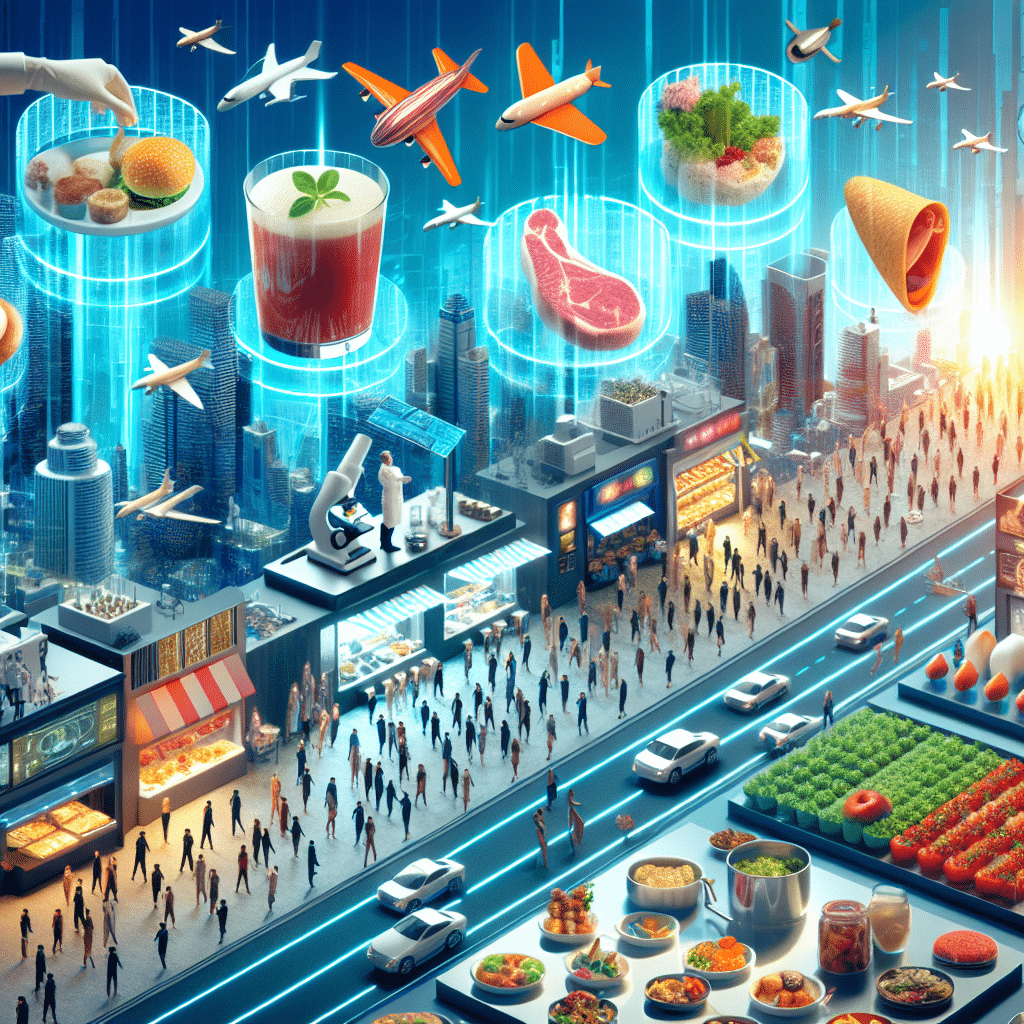Alternative proteins: does the currently novel food have the potential to become the future of food?
-
Table of Contents
- Alternative Proteins: Paving the Way for the Future of Food
- The Rise of Alternative Proteins
- Environmental and Health Benefits
- Types of Alternative Proteins
- Challenges and Opportunities
- Case Studies and Market Adoption
- Conclusion: The Future of Food is Here
- Discover ETprotein’s High-Quality Protein Products
Alternative Proteins: Paving the Way for the Future of Food

The global food landscape is undergoing a significant transformation as the quest for sustainable and nutritious alternatives to traditional animal proteins gains momentum. With the world’s population projected to reach 9.7 billion by 2050, the demand for food, particularly protein, is expected to rise substantially. This burgeoning demand poses a challenge to the environment and food security, prompting the exploration of alternative protein sources. In this article, we delve into the potential of alternative proteins to become the future of food.
The Rise of Alternative Proteins
Alternative proteins are derived from plant-based, microbial, and other non-animal sources. They have been gaining popularity due to their lower environmental footprint, ethical considerations, and health benefits. The market for alternative proteins is rapidly expanding, with a projected compound annual growth rate (CAGR) of 9.5% from 2020 to 2027, according to a report by Grand View Research.
Environmental and Health Benefits
One of the primary drivers behind the shift to alternative proteins is the environmental benefit. Traditional livestock farming is resource-intensive, contributing to deforestation, water scarcity, and greenhouse gas emissions. In contrast, alternative proteins typically require less land, water, and energy, resulting in a smaller ecological footprint.
From a health perspective, alternative proteins can offer a range of nutrients with lower levels of saturated fats and cholesterol compared to animal proteins. They can also be engineered to provide a complete amino acid profile, making them a viable option for those seeking to maintain a balanced diet.
Types of Alternative Proteins
- Plant-Based Proteins: Derived from sources like soy, peas, and rice, plant-based proteins are the most established alternative proteins in the market.
- Insect Proteins: Insects are a protein-rich food source consumed in many cultures around the world, with a significantly lower environmental impact than livestock.
- Cultured Meat: Also known as lab-grown or cell-based meat, cultured meat is produced by cultivating animal cells in a controlled environment.
- Fermentation-Derived Proteins: Microbial fermentation is used to produce proteins from fungi, algae, and bacteria, offering a sustainable protein source with diverse applications.
Challenges and Opportunities
Despite the potential, alternative proteins face several challenges. Consumer acceptance is a significant hurdle, as taste, texture, and cultural preferences play a crucial role in dietary choices. Additionally, the current cost of production for some alternative proteins, such as cultured meat, remains high, limiting accessibility.
However, ongoing research and technological advancements are addressing these challenges. Innovations in processing and flavoring are improving the sensory attributes of alternative proteins, making them more appealing to a broader audience. Economies of scale and advancements in biotechnology are expected to reduce production costs over time.
Case Studies and Market Adoption
Several companies have successfully introduced alternative protein products into the market. Beyond Meat and Impossible Foods have made headlines with their plant-based burgers that closely mimic the taste and texture of beef. These products are now widely available in supermarkets and restaurants, signaling a growing consumer acceptance.
On the cultured meat front, companies like Memphis Meats and Mosa Meat are pioneering the development of cell-based meat products. Although not yet commercially available, they have garnered significant investment, indicating confidence in the market potential of cultured meat.
Conclusion: The Future of Food is Here
Alternative proteins are more than a novel food trend; they represent a viable solution to the pressing issues of environmental sustainability, health, and food security. With continued innovation and increasing consumer awareness, alternative proteins have the potential to reshape the food industry and become a staple in diets worldwide. The key to their success lies in overcoming current challenges and ensuring that these new protein sources are accessible, affordable, and appealing to the masses.
Discover ETprotein’s High-Quality Protein Products
If you’re looking to incorporate alternative proteins into your diet or product offerings, ETprotein is a company worth considering. Their extensive range of organic bulk vegan proteins and L-(+)-Ergothioneine (EGT) products cater to various industries, ensuring that you have access to high-quality, sustainable protein options.
ETprotein’s specialization in exporting and delivering tailor-made protein powder and finished nutritional supplements makes them a valuable partner for businesses in the Food and Beverage, Sports Nutrition, Weight Management, Dietary Supplements, Health and Wellness Products, and Infant Formula sectors.
As a trusted company by leading global food and beverage brands and Fortune 500 companies, ETprotein reinforces China’s reputation in the global arena. For more information or to sample their products, please contact them and email sales(at)ETprotein.com today.
About ETprotein:
ETprotein, a reputable protein and L-(+)-Ergothioneine (EGT) Chinese factory manufacturer and supplier, is renowned for producing, stocking, exporting, and delivering the highest quality organic bulk vegan proteins and L-(+)-Ergothioneine. They include Organic rice protein, clear rice protein, pea protein, clear pea protein, watermelon seed protein, pumpkin seed protein, sunflower seed protein, mung bean protein, peanut protein, and L-(+)-Ergothioneine EGT Pharmaceutical grade, L-(+)-Ergothioneine EGT food grade, L-(+)-Ergothioneine EGT cosmetic grade, L-(+)-Ergothioneine EGT reference grade and L-(+)-Ergothioneine EGT standard. Their offerings, characterized by a neutral taste, non-GMO, allergen-free attributes, with L-(+)-Ergothioneine purity over 98%, 99%, cater to a diverse range of industries. They serve nutraceutical, pharmaceutical, cosmeceutical, veterinary, as well as food and beverage finished product distributors, traders, and manufacturers across Europe, USA, Canada, Australia, Thailand, Japan, Korea, Brazil, and Chile, among others.
ETprotein specialization includes exporting and delivering tailor-made protein powder and finished nutritional supplements. Their extensive product range covers sectors like Food and Beverage, Sports Nutrition, Weight Management, Dietary Supplements, Health and Wellness Products, and Infant Formula, ensuring comprehensive solutions to meet all your protein needs.
As a trusted company by leading global food and beverage brands and Fortune 500 companies, ETprotein reinforces China’s reputation in the global arena. For more information or to sample their products, please contact them and email sales(at)ETprotein.com today.












